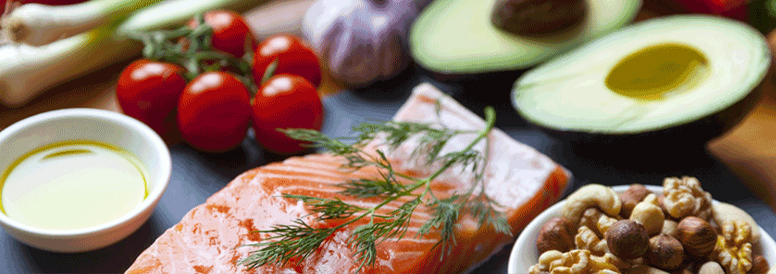Diet for Healthy Inflammatory Response
As it turns out, even though inflammation is a complex process, it’s pretty easy to explain it to patients. After all, at some point everyone has suffered from a contusion or a bump on the head. This short-lived inflammatory response is effective and necessary. Patients also seem to understand that when this response continues inside the body on an ongoing basis, that’s not good.
The scientific literature consistently shines a light on the negative effects of this type of silent inflammation. Research shows that supporting a healthy inflammatory response can be accomplished with a comprehensive, integrative plan.
The Mediterranean Diet has been widely studied and is associated with many positive health outcomes due, in large part, to its anti-inflammatory effect. In fact, on Wednesday, January 2, 2019, The Mediterranean diet was ranked #1 Best Diet Overall by US News and World Report. Hallmarks of the Mediterranean Diet include:
- Healthy fats from olive oil, fish, and nuts
- Lots of vegetables, including both cruciferous and green leafy vegetables such as broccoli, spinach and kale
- Lots of fresh fruits and berries
- Fiber packed whole grains and legumes
- Reduced intake of processed foods, fried foods, sugar, and refined carbohydrates
According to a Harvard Health article, “Doctors are finding that one of the best ways to reduce inflammation lies not in the medicine cabinet, but in the refrigerator.”
An anti-inflammatory diet is a key part of an anti-inflammatory lifestyle but it’s not the only part. Other lifestyle factors to address include:
- Sleep
- Stress
- Physical activity
Dietary supplements can also play a role. Omega-3 fatty acids are perhaps the most widely studied dietary supplement shown to support healthy inflammatory response.* A 2017 review published in the journal Oxidative Medicine and Cellular Longevity identified these fatty acids (primarily EPA and DHA) are also “specialized pro-resolving mediators.”*
Most nutrients and herbs with antioxidant properties help support a healthy inflammatory response. These include vitamins A, C, E, and D, selenium and CoQ10, resveratrol and green tea, as well as herbs and spices like turmeric or curcumin, boswellia, ginger and rosemary. Oftentimes these nutrients and herbs are combined in dietary supplements to provide synergistic support.*
Inflammation is an important natural process that protects us when necessary, but unfortunately, it’s possible to sometimes have too much of a good thing. Getting this point across to patients is important. A discussion about how diet, lifestyle, and dietary supplements can help support a healthy inflammatory response is pertinent to every patient at any age, and key to long term vitality.

